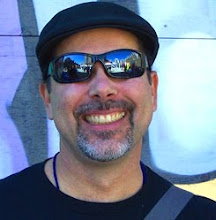
From Letter from the End of the Twentieth Century by Joy Harjo and John L. Williams:
I shared a half hour of my life this morning with Rammi, an Igbo man from northern Nigeria who drove me in his taxi to the airport. Chicago rose up as a mechanical giant with soft insides buzzing around to keep it going. We were part of the spin.
Rammi told the story of his friend, who one morning around seven - a morning much like this one - was filling his taxi with gas. He was imagining home, a village whose memories had given him sustenance to study through his degree and would keep him going one more year until he had the money he needed to return.
As the sun broke through the grey morning he heard his mother tell him, the way she had told him when he was a young boy, how the sun had once been an Igbo and returned every morning to visit relatives.
These memories were the coat that kept him warm on the streets of ice.
He was interrupted by a young man who asked him for money, a young man who was like many he saw on his daily journey onto the street to collect fares. "Oh no, sorry man. I don't have anything I can give you," he said as he patted the pockets of his worn slack, his thin nylon jacket.
He turned back to the attention of filling his gas tank. What a beautiful morning, almost warm. And the same sun, the same Igbo looking down on him in the streets of the labyrinth far far from home.
And just like that he was gone, from a gunshot wound at the back of his head - the hit of a casual murderer.
As we near the concrete plains of O'Hare, I imagine the spirit of Rammi's friend at the door of his mother's house, the bag of dreams in his hands dripping with blood. His mother's tears make a river of red stars to an empty moon.
The whole village mourns with her. The ritual of tears and drums summon the ancestors who carry his spirit into the next world. There he can still hear the drums of his relatives as they accompany him on his journey. He must settle the story of his murder before joining his ancestors or he will come back a ghost.
The smallest talking drum is an insistent heart, leads his spirit to the killer, a young Jamaican immigrant who was traced to his apartment because his shirt of blood was found by the police, thrown off in the alley with his driver's license in the pocket.
He searches for his murderer in the bowels of Chicago and finds him shivering in a cramped jail cell. He could hang him or knife him - and it would be called suicide. It would be the easiest thing.
But his mother's grief moves his heart. He hears the prayers of the young man's mother. There is always a choice, even after death.
He gives the young man his favorite name and calls him brother. The young killer is then no longer shamed but filled with remorse and cries all the cries he has stored for a thousand years. He learns to love himself as he never could, because his enemy, who has every reason to destroy him, loves him.
That's the story that follows me everywhere and won't let me sleep: from Tallahassee Grounds to Chicago, to my home near the Rio Grande.
It sustains me through these tough distances.



No comments:
Post a Comment